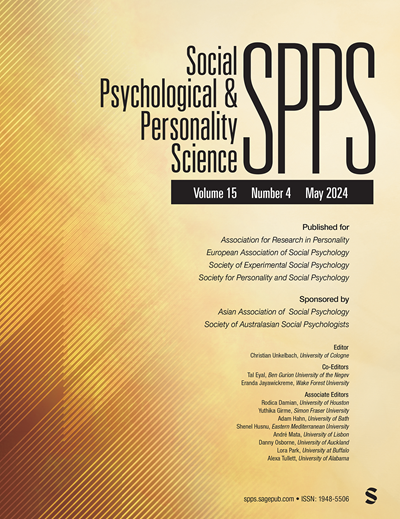Judging Guilt: Implicit Evaluations of Defendants Predict Verdicts
IF 3.3
2区 心理学
Q1 PSYCHOLOGY, SOCIAL
引用次数: 0
Abstract
Cognitive jurisprudence research that has used indirect measures has mostly focused on how people’s implicit biases (e.g., race) predict people’s verdicts for an individual belonging to an out-group. We aim to expand on this work by investigating implicit evaluations’ predictive strength for verdicts using an impression formation approach. In three preregistered studies, we presented mock jurors with a fictional murder trial in which the evidence against a defendant was mixed: some witnesses provided testimony suggesting guilt, whereas others sowed doubt. In all studies, implicit evaluations of the defendant, operationalized by the Affect Misattribution Procedure (AMP) scores, uniquely predicted verdicts above and beyond explicit evaluations (Studies 1–3), the reason for evidence exclusion (Study 2), and demographics of the defendant (Study 3). These findings advance our understanding of implicit social cognition by demonstrating that implicit evaluations, operationalized by the AMP scores, can have predictive power in complex, ecologically rich contexts.判断有罪:被告的内隐评价预测判决
使用间接测量的认知法学研究主要集中在人们的内隐偏见(例如,种族)如何预测人们对属于外群体的个体的判决。我们的目标是通过使用印象形成方法研究内隐评估对判决的预测强度来扩展这项工作。在三个预先登记的研究中,我们向模拟陪审员展示了一个虚构的谋杀案审判,其中针对被告的证据是混合的:一些证人提供的证词表明有罪,而另一些证人则播下怀疑的种子。在所有的研究中,由影响错误归因程序(AMP)分数操作的被告内隐评价,在外显评价(研究1-3)、证据排除的原因(研究2)和被告的人口统计学(研究3)之外,唯一地预测了判决。这些发现通过证明由AMP分数操作的内隐评价可以在复杂的、生态丰富的环境。
本文章由计算机程序翻译,如有差异,请以英文原文为准。
求助全文
约1分钟内获得全文
求助全文
来源期刊

Social Psychological and Personality Science
PSYCHOLOGY, SOCIAL-
CiteScore
12.50
自引率
1.80%
发文量
77
期刊介绍:
Social Psychological and Personality Science (SPPS) is a distinctive journal in the fields of social and personality psychology that focuses on publishing brief empirical study reports, typically limited to 5000 words. The journal's mission is to disseminate research that significantly contributes to the advancement of social psychological and personality science. It welcomes submissions that introduce new theories, present empirical data, propose innovative methods, or offer a combination of these elements. SPPS also places a high value on replication studies, giving them serious consideration regardless of whether they confirm or challenge the original findings, with a particular emphasis on replications of studies initially published in SPPS. The journal is committed to a rapid review and publication process, ensuring that research can swiftly enter the scientific discourse and become an integral part of ongoing academic conversations.
 求助内容:
求助内容: 应助结果提醒方式:
应助结果提醒方式:


